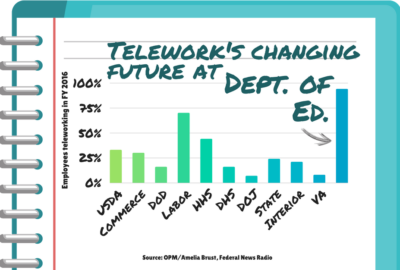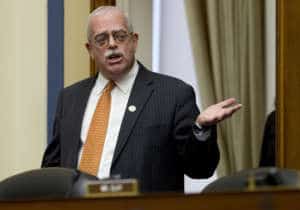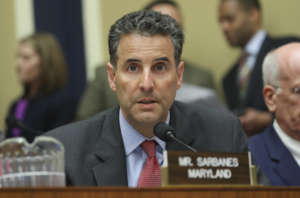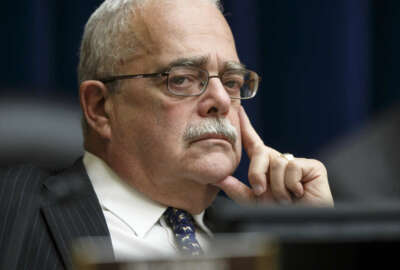
DC-area lawmakers look to expand telework use amid cuts by Education, USDA
Following the recent rollback of telework agreements at the Education and Agriculture departments, two D.C.-area lawmakers have introduced legislation aimed at...
Following the recent rollback of telework agreements at the Education and Agriculture departments, two D.C.-area lawmakers have introduced legislation aimed at protecting and expanding existing agency telework agreements.

The Telework Metrics and Cost Savings Act, introduced by Reps. Gerry Connolly (D-Va.) and John Sarbanes (D-Md.) Thursday, would prohibit agencywide policies that restrict telework.
“Telework increasingly becomes critical to continuity of operations, without which the government shuts down,” Connolly said Wednesday at House Oversight and Government Reform Committee hearing. “What has disturbed me is that the Trump administration seems to be going in exactly the wrong direction with respect to telework.”
The bill would effectively block new, restrictive telework policies at the Education and Agriculture Department, and would require other agencies to notify Congress about any upcoming plans to reduce telework.
If an agency decides to scale back its telework policy, the bill also requires leadership to explain how it’ll make up for any lost cost savings.
Following USDA’s decision to cut telework, Connolly met with Jared Kushner, the head of the Office of American Innovation, and Chris Liddell, the White House deputy chief of staff for policy coordination, to express his concerns over the new policy.
While Connolly said the White House meeting had eased his concerns about further cuts to telework, the release of a new, restrictive telework policy at Education has renewed fears that the Trump administration might soon back a governmentwide reduction of telework.
“I’m particularly bothered by this because we actually had a good meeting at the White House, where we found common ground, and I reassured Mr. Kushner and Mr. Liddell that if they continued going in the direction they described, they’d have our support,” he said. “This seems to fly in the face of the kind of progress we thought we were going to make in common.”
USDA first to curb teleworking, then Dept. of Ed.
In January, USDA’s Office of Human Resources Management sharply curtailed telework for all its employees, restricting them to two teleworking days per pay period, or about four days per month.
USDA only gave its workforce about a month to comply with the new telework policy, but extended the timeframe by an extra 30 days for some agency employees.
In May, the Education Department’s Office of Management told employees they’d be required to work in the office at least four days a week, starting in October, effectively limiting most of its workforce to teleworking one day a week.

“I don’t know anyone in the telework profession who would agree with that definition. Telework is to be encouraged more than one day a week. It’s a structured program — it’s not a spontaneous, ‘Do you feel like teleworking today?’ That not how it works,” Connolly said. “We want to get the maximum benefits, and we want to deploy technology, and we want to make sure this is part of the offering for the next generation of federal employees. Because millennials expect that as part of the offering.”
The bill would also clarify the definition of telework to include full-time telework, and would require the Office of Personnel Management to include in its annual telework reports a plan to prevent the government telework participation rate from declining.
Last year, the agency reported 22 percent of federal employees used some level of telework in FY 2016, up from 14 percent in FY 2012.
“Federal government telework programs not only improve productivity, but also save taxpayer money by increasing efficiency, strengthening employee retention and reducing costs for federal office space, as numerous studies have demonstrated,” Sarbanes said in a statement. “We must push back against the Trump administration’s repeated attacks on federal telework programs, which make our government work better for the American people.”
Previously, Connolly and Sarbanes also introduced the 2010 Telework Enhancement Act, which required agencies to create a telework plan and fulfill certain requirements encouraging its use.
Bill requires setting goals for more telework
The new bill, if passed would require all agencies to set annual goals for greater adoption of telework. In FY 2017, only 83 percent of agencies did so.
That same year, the Departments of Justice, Health and Human Services, and Housing and Urban Affairs didn’t report any telework goals for their workforces. Prior to their new policies, both Education and USDA had encouraged greater adoption of telework.
According to OPM’s latest telework report to Congress, more than 32,000 USDA employees teleworked at least one day a week in fiscal 2016. Of those, more than 9,600 employees teleworked at least three days a week.
OPM data also shows that 94 percent of Education’s 4,388 employees were eligible for telework in 2016, and the same percentage made use of the policy that year. At least 16 percent of the agency’s workforce teleworked three or more days a week — a work schedule not permitted under the new policy.
Federal Chief Information Officer Suzette Kent said the President’s Management Agenda aims to make the federal workforce less dependent on the need to work from an office cubicle.
“Some of the investments we’re making in digital capabilities and new workforce tools actually enable work to be done from a broader reach of locations,” Kent said at Wednesday’s hearing.
In a related example, she added that multiple cross-agency priority goals look to reduce the use of paperwork, which as a side benefit could enable greater ease of telework.
The National Active and Retired Federal Employees Association, the National Treasury Employees Union, the National Federation of Federal Employees and the American Federation of Government Employees have all endorsed the bill.
NTEU President Tony Reardon said agencies rely on telework to help employees avoid the time and expense of long commutes.
“Telework is a smart, progressive workplace policy that increases productivity, cuts administrative costs and is frequently cited as a factor in retaining highly trained employees,” Reardon said in a statement. “Rep. Connolly and Rep. Sarbanes, who represent thousands of federal employees, know first-hand the value of teleworking and how it improves the quality of life for employees and taxpayers alike, and we applaud their legislation that would help preserve it.”
Copyright © 2025 Federal News Network. All rights reserved. This website is not intended for users located within the European Economic Area.
Jory Heckman is a reporter at Federal News Network covering U.S. Postal Service, IRS, big data and technology issues.
Follow @jheckmanWFED





